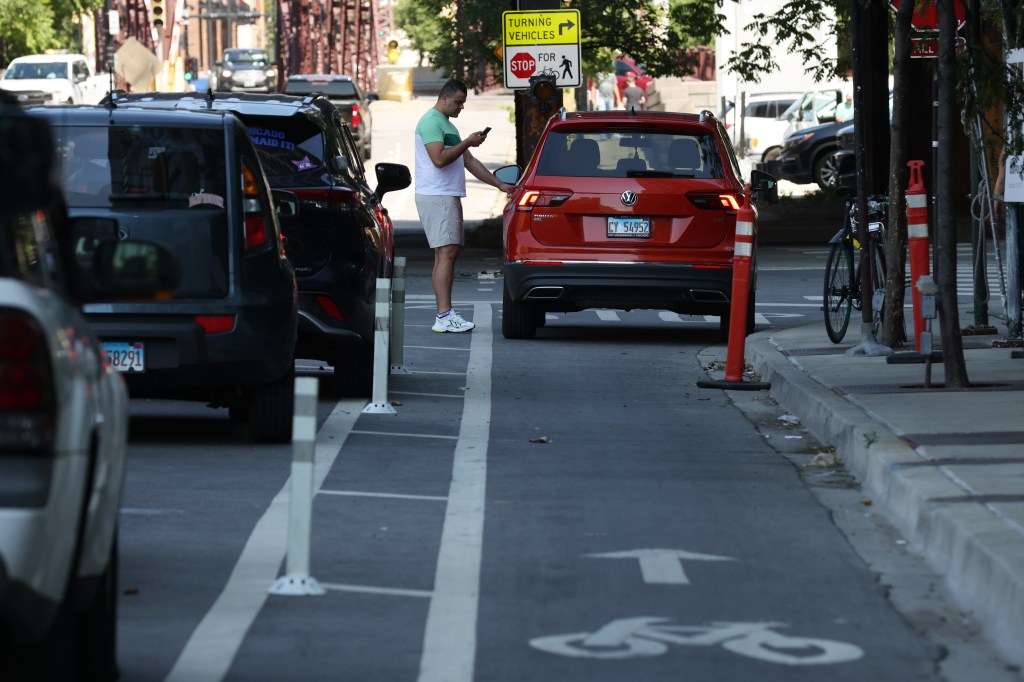In February, Chicago transportation Commissioner Tom Carney told aldermen a program that will test automated ticketing of drivers parked in bike and bus lanes downtown could be up and running by summer.
Transportation officials were “working toward trying to have it stood up by this summer, so that we can then start testing it out and implementation of the pilot,” he said at the time.
But the start of the program has been pushed back, the Chicago Department of Transportation confirmed. Now the program, on the books for more than a year, isn’t expected to start until fall, as the process to acquire supplies and services for the pilot is ongoing.
“Just to be slow to roll this out sort of shows that maybe there’s not enough emphasis on public transportation, as there should be,” said W. Robert Schultz III , campaign organizer with the advocacy group Active Transportation Alliance. “It’s the poor stepchild as city issues go.”
After aldermen approved the program, called Smart Streets, in March 2023, the city touted it as a way to improve safety for cyclists and pedestrians downtown and speed up bus service.
It allows cameras mounted on poles or city or CTA vehicles to be used to enforce parking violations in bike lanes, bus lanes, crosswalks, bus stops and no-parking zones. The program also includes an effort to prevent double parking in commercial loading zones. Warnings are to be sent to drivers instead of tickets for the first 30 days after a camera is installed.
The pilot program is set to cover only the areas around downtown, roughly between North Avenue to the north, Roosevelt Road to the south, Ashland Avenue to the west and the lake.
But work is still underway to get the effort up and running. That includes finalizing software that will allow violations to be processed and identified, said Ald. Daniel La Spata, one of the sponsors of the measure.
“It’s frustrating that we’re talking about this 18 months after we passed the ordinance,” La Spata, 1st, said.
Transportation department spokeswoman Erica Schroeder said the city has been working since Smart Streets was approved on research, discussions with vendors and designing procedures among various departments.
The CTA is in the process of procuring cameras for the program and hopes to install them on buses later this year, the agency said.
“While the start date is later than initially planned, we are actively working to ensure that, once operational, the pilot can provide valuable insights and, most importantly, encourage safer driving behaviors,” Schroeder said in an email.
The program, as initially approved, is set to end June 30, 2025, leaving less than a year for the test run. Carney said in February CDOT wanted to have a year of data on the pilot before it reported back to the City Council about the project.
Ald. Brendan Reilly, whose 42nd Ward includes parts of the area that would be covered by the pilot, introduced a measure to extend the program to June 30, 2026. The effort has so far made little progress through the City Council approval process.
Schroeder said extending the test “will ensure that the pilot runs long enough for the city to gather comprehensive data and effectively assess its outcomes.”
The city’s use of automated ticketing for other types of enforcement, such as speed and red-light cameras, has long been controversial, with city officials pitching the programs as safety measures but critics painting them as a cash grab or arguing they do little to boost safety. Several earlier investigations found the city’s ticketing practices hit low-income violators hardest and were disproportionately owed by drivers of color.
The effects of vehicles parked in bike lanes have also drawn heightened attention. particularly after 3-year-old Lily Grace Shambrook was killed in a bike crash in Uptown in 2022. The bicycle she was being carried on was forced to maneuver around a ComEd truck parked in the bike lane, and a semitruck collided with the bike, according to media reports.

The ticketing pilot program could also have significant benefits for CTA buses, Schultz said. Buses are the backbone of the city’s transportation system, he said, but are often slow, get stuck in traffic, and tend to become bunched together, with several arriving at a stop in a row.
Parking in bus lanes, or using them for delivery dropoffs, only exacerbates the problem, he said.
The delay in getting the pilot program up and running is frustrating, Schultz said, and doesn’t bode well for potential future efforts to expand it elsewhere in the city.
“You can count on people not obeying the red,” he said, referring to the red paint that designates a bus lane.


